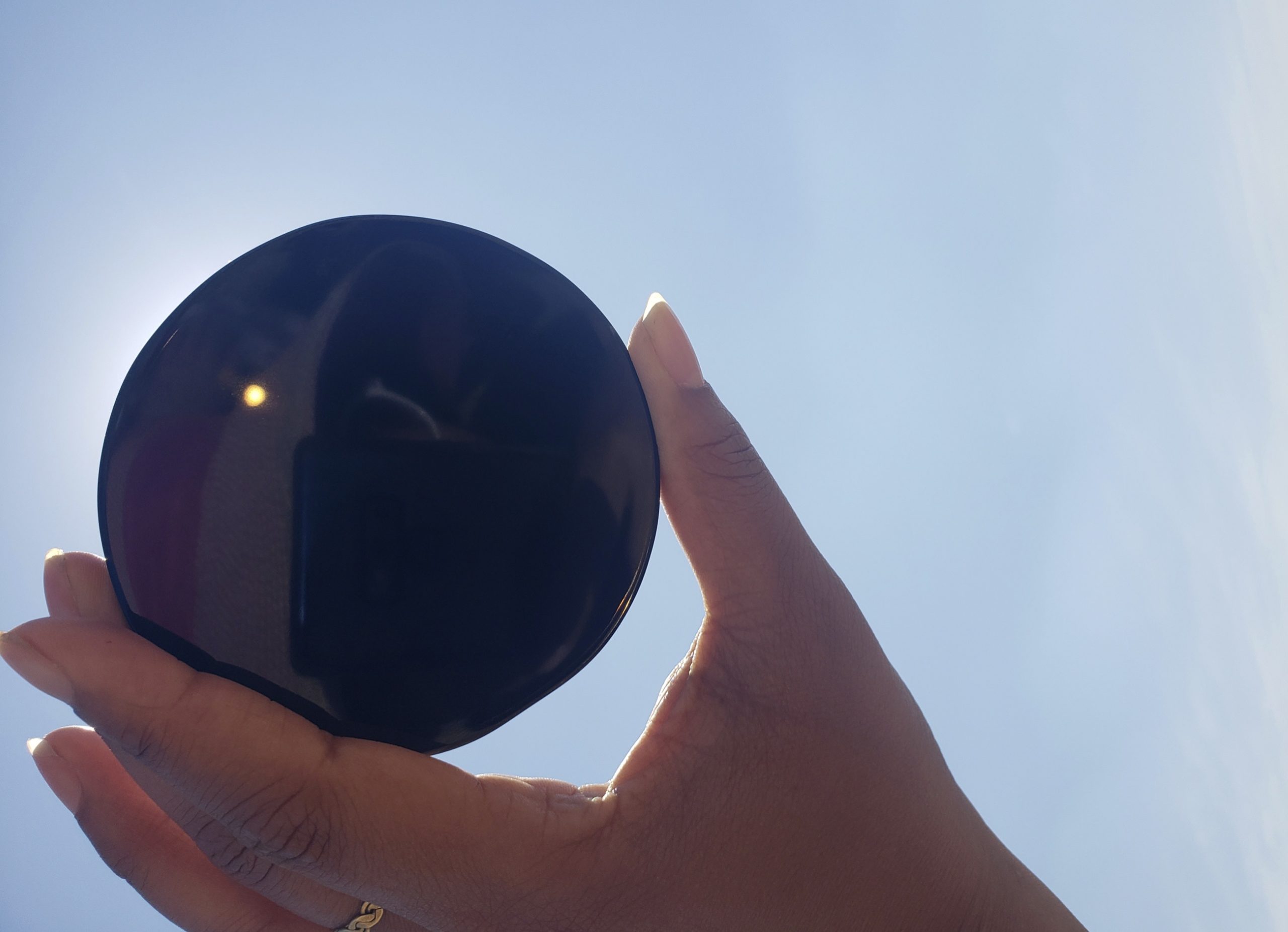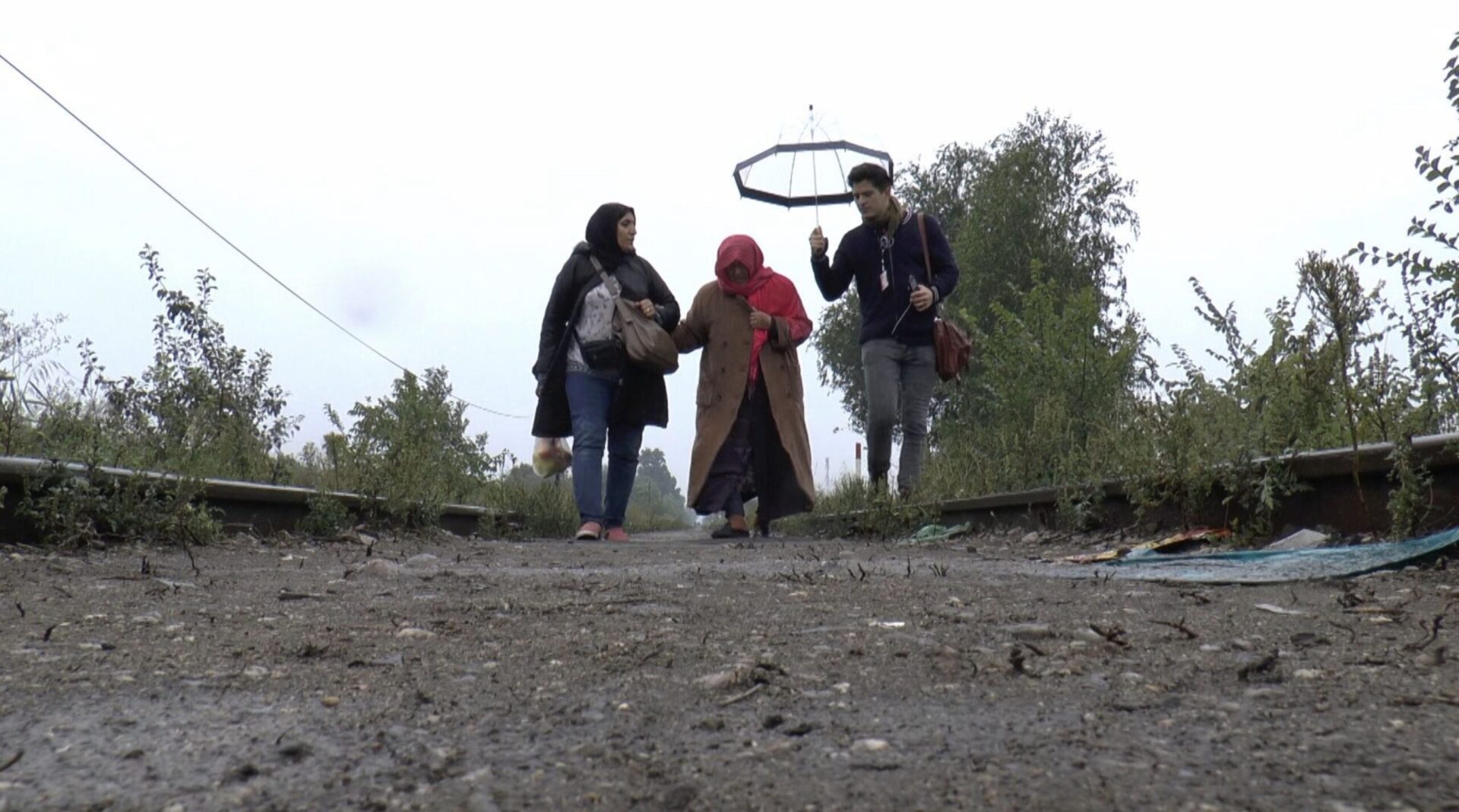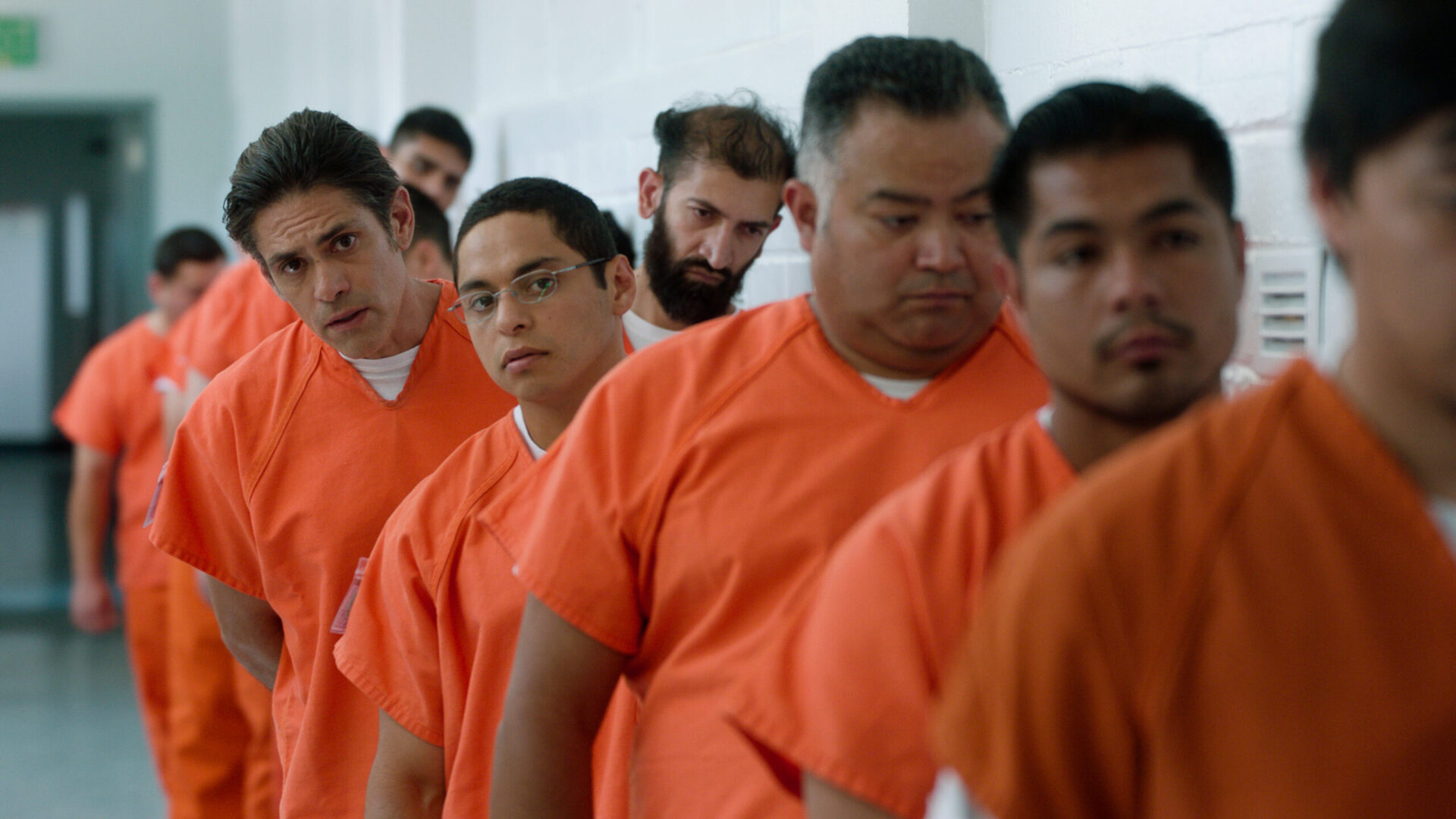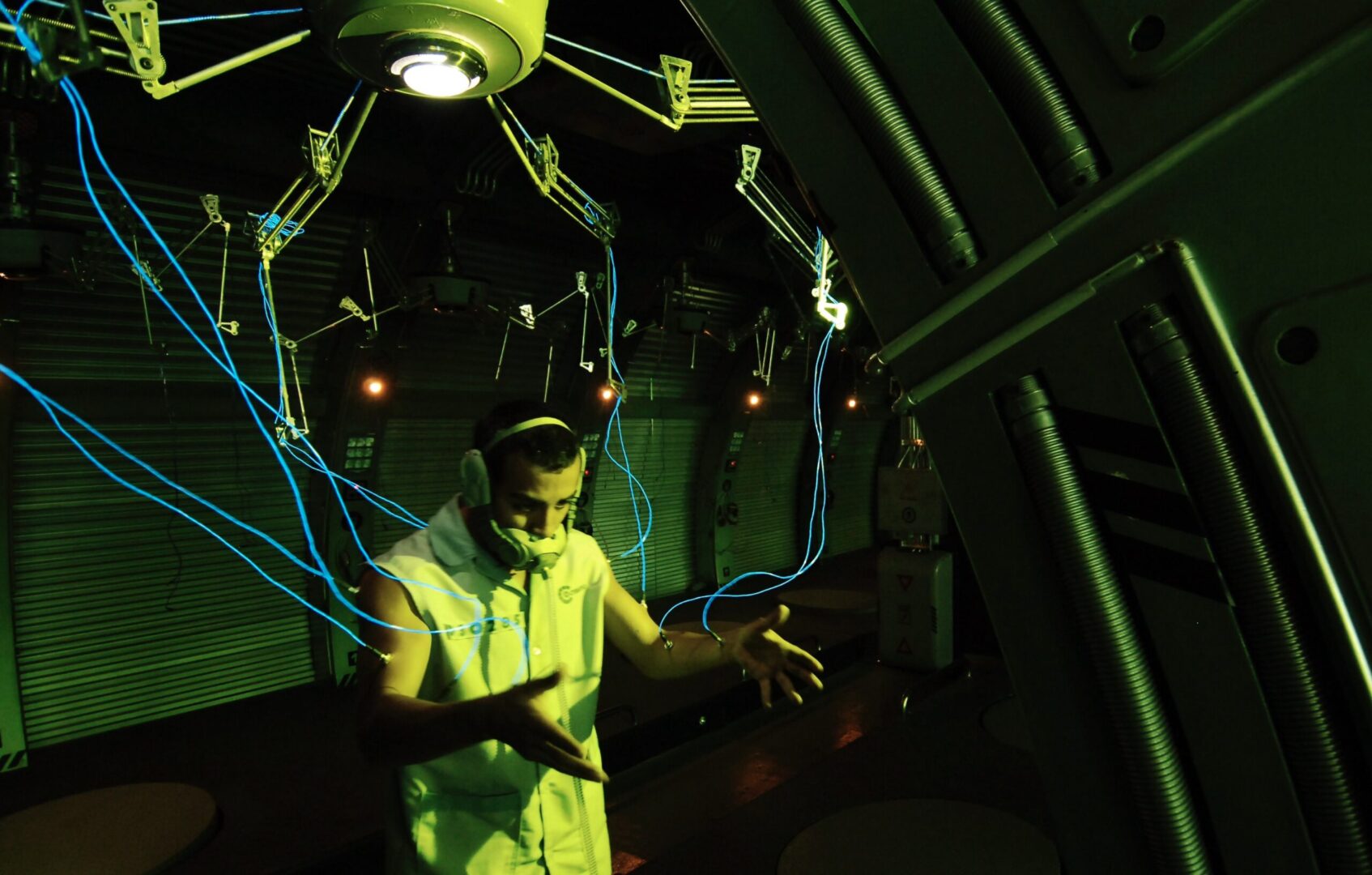
- This event has passed.
Crystal Z Campbell and Allan Jamieson

Tuesday, May 3, 7 pm
at Journeys End Refugee Services theater (5th floor of Tri-Main Building, 2495 Main St #530, Buffalo, NY 14214)
Free or suggested donation
Click here to register
Access information: Proof of COVID-19 vaccination through a Vaccination card or NY Excelsior Pass will be required for entry. Masks will be required for the duration of the event.
Featuring three short films of legends that flow from Niagara Falls to Sweden, Squeaky Wheel and Buffalo Arts Studio present an evening with filmmakers Crystal Z Campbell and Allan Jamieson. The three films bring to fore questions on how we imagine and relate to lands we inhabit, from the settler-colonial mindset critiqued in Jamieson’s 1996 documentary Thunderbeings and the Maid of the Mist, to the fugitivity of migrants in contemporary Sweden in Campbell’s VIEWFINDER. The hour long program will be followed by a Q&A with Campbell and Jamieson on their work and the shared themes between their films.
The program is presented as part of Crystal Z Campbell, VIEWFINDER, an immersive film installation at Buffalo Arts Studio that takes cues from Swedish folktales, gestures, and movements to explore belonging, allyship, and living monuments. If our bodies are archives, what is the currency of place, of movement, of memory?
Program
Crystal Z Campbell, A Meditation on Nature in the Absence of an Eclipse, 8:12 min, 2016-2020
A Meditation on Nature in the Absence of an Eclipse is a poetic glimpse of how centuries of extraction, racism, pollution, and commoditizing nature has altered our relationship to sacred land and resources. How has nature been historically shaped and imaged for pleasure, status, and control by many hands of invisible labor? Constellated and intersectional histories and source material include testimony from a Water Protector at Standing Rock protesting the Dakota Access Pipeline, contaminated water in Flint Michigan, original footage of Hierve el Agua near Oaxaca, Mexico revered for its healing properties, archival images of gardens and hands of artists who resided in Tulsa, Oklahoma and children brushing their teeth––a reflection of the innocuous ways which contaminated water and resources shapes the lives of individuals completing banal, daily, routine tasks.
Critical to the film is the intentional use of unlicensed footage, bearing a brand across the center that detracts from what’s happening in the actual footage, and becomes a viewfinder for how that footage is read or deemed important enough to view because there is a branded stamp of approval. Historically, the watermark is used to connote ownership and authenticity. The film is a consideration of how documentary practice can be another form of resource extraction, of which this filmmaker is implicated. Licensing fees are an example of the barriers to access, ultimately deciding who will control critical narratives of environmental racism and discourse. Originally commissioned by Wave Hill Public Garden & Cultural Center, the work was made in 2017 and reedited in 2020. – Crystal Z Campbell
Allan Jamieson, Thunderbeings and the Maid of the Mist, 26 min, 1996
“This is a Seneca teaching story, whose true meaning is one of sharing. The sharing of information with each other. The sharing of letting each other know when something is wrong.” – Allan Jamieson
Charting both a moment in Western New York’s Native American activism and a rare document of a Seneca chief and elder, Allan Jamieson’s 1996 film Thunderbeings and the Maid of the Mist takes on a racist educational video and retelling of the Haudenosaunee legend of the Maid of the Mist by the Maid of the Mist corporation, which operates the famous Niagara Falls boat tours. Jamieson’s documentary showcases segments of the Maid of the Mist corporation’s video, showcasing how it is informed by Western and colonial viewpoints, followed by interviews with tourists on their thoughts on the legend. The film is especially notable for featuring an extended interview with the late Seneca Chief and elder Corbett Sundown, who tells the original story of the Maid of the Mist as it was told to him by his grandparents, and passed away after filming was completed.
The film was part of extended efforts by our region’s Native American communities to pressure the Maid of the Mist Corporation to change its false gallery exhibit and video. Initially resistant, the Maid of the Mist Corporation eventually did so.
The documentary received support from the New York State Council of the Arts, and was edited in Squeaky Wheel’s post-production studio in 1996. The film is presented here in a digital transfer from a 3/4 tape, broadcast as part of Squeaky Wheel’s Axlegrease television show in 1997. Learn more about Axlegrease here. – Ekrem Serdar
Crystal Z Campbell, VIEWFINDER, 18:26 min, 2020
Filmed entirely in Swedish spa town, VIEWFINDER takes cues from political gestures, and decisive movements to explore belonging, allyship, and monuments. – Crystal Z Campbell
Biographies of the artists
Allan Jamieson is a Faithkeeper from the wolf clan of the Cayuga people, one of the Six Nations. Coordinator of Neto, a Native American managed non-profit organization. He brings a wealth of knowledge and research in his presentations. One of the founding members of Neto, he is responsible for the overall management of the organization including meeting the goals, coordinating activities and managing the budget. His experience includes extensive research on the WNY geographic area and oral history related to the WNY. Currently he is responsible for coordinating art exhibits and projects sponsored by Neto… and these activities include scheduling artist workshops, hiring artists and curators, scheduling exhibits and providing publicity for all events. His educational background includes a Bachelor of Arts from the State University of New York College at Buffalo and a Master of Arts from the University of Buffalo, 1987. While a graduate student he developed and taught the currently offered course in Native American literature. In addition to his interest in art he recently completed training as a Alternative Dispute Resolution facilitator to work with families in crises. He has been an active member of the Native community in the Western New York region which includes the Buffalo and Niagara Falls areas for the past 20 years assisting area art institutions with Native American programming.
Crystal Z Campbell (they/them) is currently a 2021–22 UB Center for Diversity Innovation Distinguished Visiting Scholar, multidisciplinary artist, experimental filmmaker, and writer of Black, Filipinx, and Chinese descents. A 2021 Guggenheim Fellow in Fine Arts, Campbell finds complexity in public secrets—fragments of information known by many but undertold or unspoken. Their archive-driven work in film/video, performance, installation, sound, painting, and text, has been exhibited at The Drawing Center, Nest, ICA-Philadelphia, Bemis, Studio Museum of Harlem, SculptureCenter, and SFMOMA, and a forthcoming monographic screening at MOMA. Honors and awards include the Pollock-Krasner Award, MAP Fund, MacDowell, Skowhegan, Rijksakademie, Whitney ISP, Franklin Furnace, Tulsa Artist Fellowship, UNDO Fellowship, and Flaherty Film Seminar. Campbell’s writing has been featured in World Literature Today, Monday Journal, GARAGE, and Hyperallergic. Campbell, a former Harvard Radcliffe Film Study Center & David & Roberta Logie Fellow, was recently named a Creative Capital Awardee, and is founder of the virtual programming platform archiveacts.com.
This program is supported by the Andy Warhol Foundation of the Visual Arts and presented in collaboration with Buffalo Arts Studio. Special thank you to Journey’s End Refugee Services.




